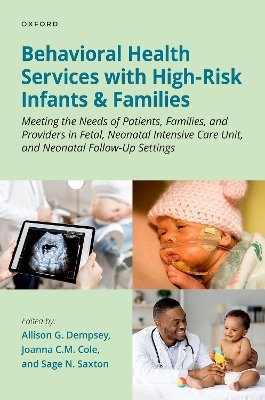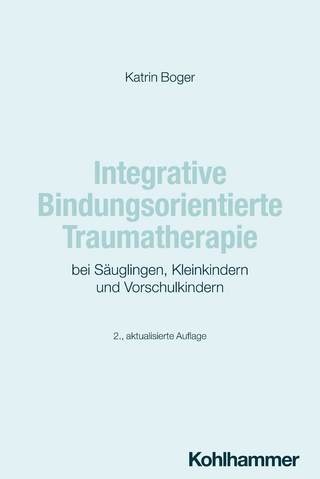
Behavioral Health Services with High-Risk Infants and Families
Oxford University Press Inc (Verlag)
978-0-19-754502-7 (ISBN)
Behavioral Health Services with High-Risk Infants & Families is a practical guide for mental health clinicians working in fetal care, NICU, and neonatal follow-up care. The book provides a broad overview of common medical conditions in fetal and NICU settings (e.g., congenital anomalies, premature birth, hypoxic injury in the perinatal period), prevalence, and symptoms of behavioral health challenges, specific considerations for assessment and intervention, and cross-cutting issues to assist the clinician with optimizing behavioral health care integration with mothers, partners, babies, and families. Additionally, information about the provision of psychosocial support and education to staff is also included. The text represents a comprehensive, practical resource for behavioral health clinicians working with pregnant women, partners, infants, families, and providers in perinatal and neonatal intensive care settings. The book features de-identified case examples, trauma-informed care prompts/scripts, specific questions for assessment and intakes, key medical terms, resource guides, and reference lists.
Allison G. Dempsey, PhD is a licensed psychologist and Associate Professor of Psychiatry at University of Colorado School of Medicine. She is the Director of the Connections Program for High-Risk Infants and Families and the Perinatal Behavioral Health Pathways Program. She has worked with high-risk infants and families for over a decade across fetal care, neonatal intensive care, and neonatal follow-up settings. She is the elected co-chair of the executive committee of the National Network of NICU Psychologists. Her clinical work focuses on the development and psychological and behavioral functioning of high-risk infants and their families across the continuum of medical settings from pregnancy through early childhood. Her research focuses on models of care for behavioral health service delivery with high-risk infants and families. Joanna C.M. Cole, PhD, PMH-C is a licensed clinical psychologist and Associate Professor of Clinical Psychology in Psychiatry at the Perelman School of Medicine at the University of Pennsylvania. She is the manager of psychosocial programs within the Center for Fetal Diagnosis and Treatment at the Children's Hospital of Philadelphia, caring for expectant parents diagnosed with a fetal birth defect. Dr. Cole provides psychotherapy with individuals and couples on effective coping strategies and emotional preparation for different stages in the medical experience, from pregnancy diagnosis and prenatal care, through the birth process and the neonatal intensive care stay. She also provides options counseling and grief support to help families plan for and cope with the intrauterine and/or neonatal death of their baby. She is the Associate Clinical Chair for the Family StEPS Program, a new initiative across CHOP's fetal and early childhood programs to provide resources, clinical care, and partnerships to help nurture parental-child attachment and development. Dr. Cole is also an active member in Postpartum Support International, where she acts as an international trainer and Curriculum Manager for the Perinatal Mood Disorders Components of Care 2-Day Training Course and Advanced Psychotherapy Course. Sage N. Saxton, PsyD is a licensed psychologist whose work focuses on children and families from birth through early childhood. Dr. Saxton is a Professor of Pediatrics with the Oregon Health & Science University's (OHSU) Institute on Development and Disability (IDD). She is the Director of the NICU Follow Up Program and has worked with high-risk infants and their families for over 13 years. Dr. Saxton is an active member of both the National Perinatal Association (NPA) and Postpartum Support International and serves on the Board of Directors for the NPA. She is the elected co-chair of the executive committee of the National Network of NICU Psychologists. Dr. Saxton's research interests include developmental and educational outcomes for children born prematurely, children's adjustment to traumatic loss, and the provision of hospital-based parental support. She is actively involved in programmatic development efforts nationally to improve family and patient centered NICU care.
SECTION I: ROLES AND PRACTICE ISSUES
1. History of Psychological Services in Neonatal Intensive Care
Michael T. Hynan
2.Roles, Activities, and Opportunities of Behavioral Health Clinicians in Delivering Continuity of Care
Tiffany Willis, LaTrice L. Dowtin, Dailyn Acosta, and Kara Hansen
3.Quality Improvement and Research Across Fetal and Neonatal Care Settings
Pamela A. Geller, Ariana Albanese, Victoria A. Grunberg, John Chuo, and Chavis A. Patterson
4.Systems Interventions and Program Development
Susanne Klawetter, Jill A. Hoffman, Kristi Roybal, and Sunah S. Hwang
5. Interdisciplinary Behavioral Health Teams
Chavis A. Patterson, Mona Elgohail, Alison Hartman, Vincent C. Smith, and Pamela A. Geller
6. Teaching and Training Developing Professionals in Perinatal and Neonatal Settings
LaTrice L. Dowtin, Tiffany Willis, Soudabeh Givrad, and Melissa Scala
7.Operations and Ethical Considerations
Elizabeth Fischer, KristiLynn Cedars, Abbey Kruper, and Steven R. Leuthner
SECTION II: CROSS-CUTTING MENTAL HEALTH ISSUES AND APPROACHES
8. Infant Mental Health for High-Risk Infants Across the Continuum of Care
Miller Shivers, Annelise Cunningham, Natalia Henner, and Kerri Machut
9.Perinatal Mood and Anxiety Disorders Among Parents of High-Risk Fetuses and Infants
Birdie Meyer, Brenda Papierniak, and Christena Raines
10. Screening for Perinatal Mood and Anxiety Disorders Across Settings
Amy E. Baughcum, Olivia E. Clark, Shannon L. Gillespie, and Jeanne Decker
11. Psychotherapy and Medication Interventions for Perinatal Mood and Anxiety Disorders Across Settings
Teni Davoudian, Jacquelyn Knapp, Lana Weber, and Nicole Cirino
12. Trauma and Trauma Informed Care
Mary Coughlin
13. Addressing Perinatal Substance Use Across the Continuum of Care
Jennifer J. Paul, Jessalyn Kelleher, Susanne Klawetter, and Sarah Nagle-Yang
14. Human Milk and Breastfeeding
Diane L. Spatz and Elizabeth D. Morris
15. Shared Decision-Making Across Settings
Jeannie Zuk, Kristin Carter, Beth McManus, and Brooke Dorsey Holliman
16. Perinatal Crisis and Traumatic Bereavement
Mara Tesler Stein and Deborah L. Davis
17. The Value of Peer Support for High-Risk Pregnant Women and Their NICU Infants
Sue L. Hall, Jenny Landry, and Erin Thatcher
SECTION III: FETAL CARE SETTINGS
18. Specialty Care Settings: Perinatal Management, Fetal Therapy and the Fetal Therapy Center
Christina Paidas Teefey, Sarah Robinson, and Julie S. Moldenhauer
19. Role of Behavioral Health Clinicians in Fetal Care Settings
Lacy Chavis, Sakina Butt, and Elizabeth Vaught
20. Uncertainty and Coping in the NICU: Relationships Matter
Zina Steinberg and Susan Kraemer
SECTION IV: NEONATAL INTENSIVE CARE SETTINGS
21. Neonatal Intensive Care Settings
Sara C. Handley and David Munson
22. Role of Behavioral Health Clinicians in the NICU Setting
Rochelle Steinwurtzel, Sandhya Brachio, Sheau-Yan Ho, Solimar Santiago-Warner
23. Regulation, Relationships, and Reflection: Developmental Care in the NICU
Ayelet Talmi and Joy V. Browne
24. Mental Health and Coping Challenges Among Families in the NICU
Jennifer Harned Adams, Stacey R. Bromberg, and Anna Zimmerman
SECTION V: NEONATAL FOLLOW-UP SETTINGS
25. A Brief History of Neonatal Follow Up and Why It's Done
Howard Needelman, Beatrice Egboh, Whitney Strong-Bak, and Grace Winningham
26. Common Neurodevelopmental and Behavioral Challenges in Neonatal Follow-Up
Kathryn E. Gustafson and Mollie G. Warren
27. Role of Behavioral Health Clinicians in Neonatal Follow-Up Settings
Casey Hoffman and Annie Markovits
28. After the NICU: Primary Care Behavioral Health Services
Verenea J Serrano, Jonna von Schulz, Melissa Buchholz, Kristina Malik, Amy Wrenn, and Ayelet Talmi
| Erscheinungsdatum | 08.09.2022 |
|---|---|
| Zusatzinfo | 25 tables; 5 halftones |
| Verlagsort | New York |
| Sprache | englisch |
| Maße | 237 x 156 mm |
| Gewicht | 699 g |
| Themenwelt | Geisteswissenschaften ► Psychologie ► Familien- / Systemische Therapie |
| Geisteswissenschaften ► Psychologie ► Klinische Psychologie | |
| Medizin / Pharmazie ► Medizinische Fachgebiete ► Gynäkologie / Geburtshilfe | |
| Medizin / Pharmazie ► Pflege | |
| ISBN-10 | 0-19-754502-5 / 0197545025 |
| ISBN-13 | 978-0-19-754502-7 / 9780197545027 |
| Zustand | Neuware |
| Haben Sie eine Frage zum Produkt? |
aus dem Bereich


